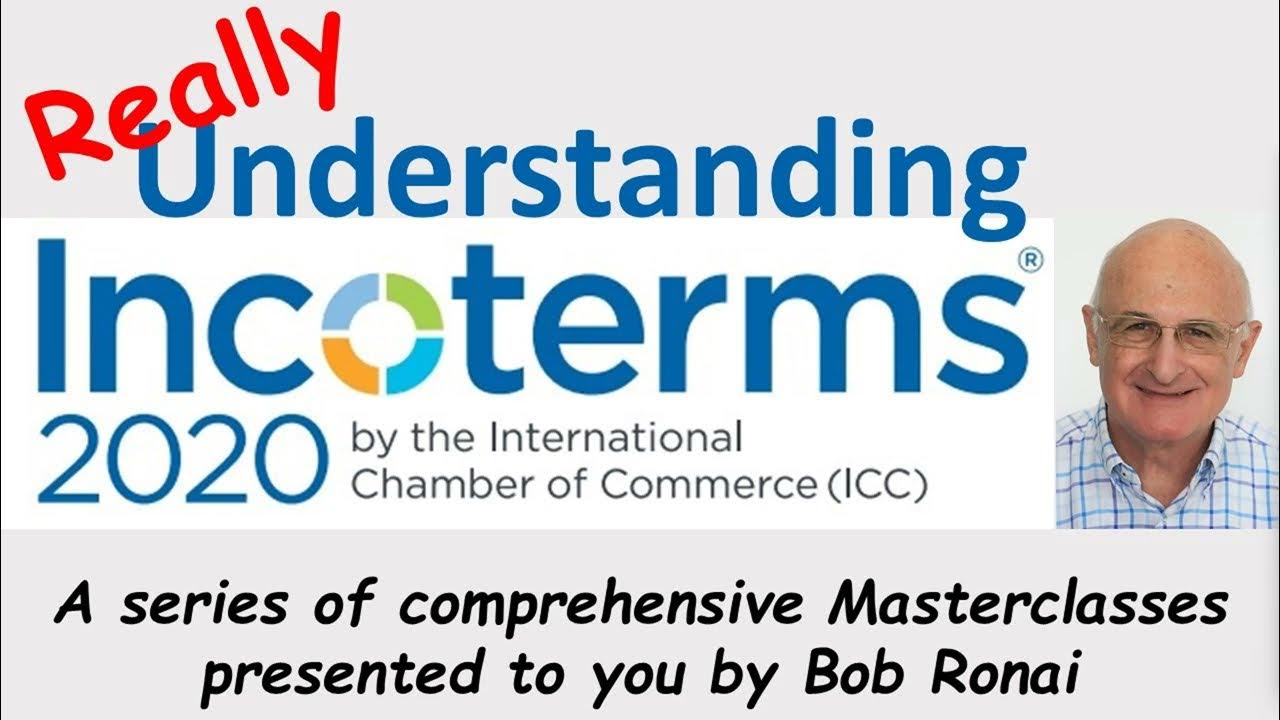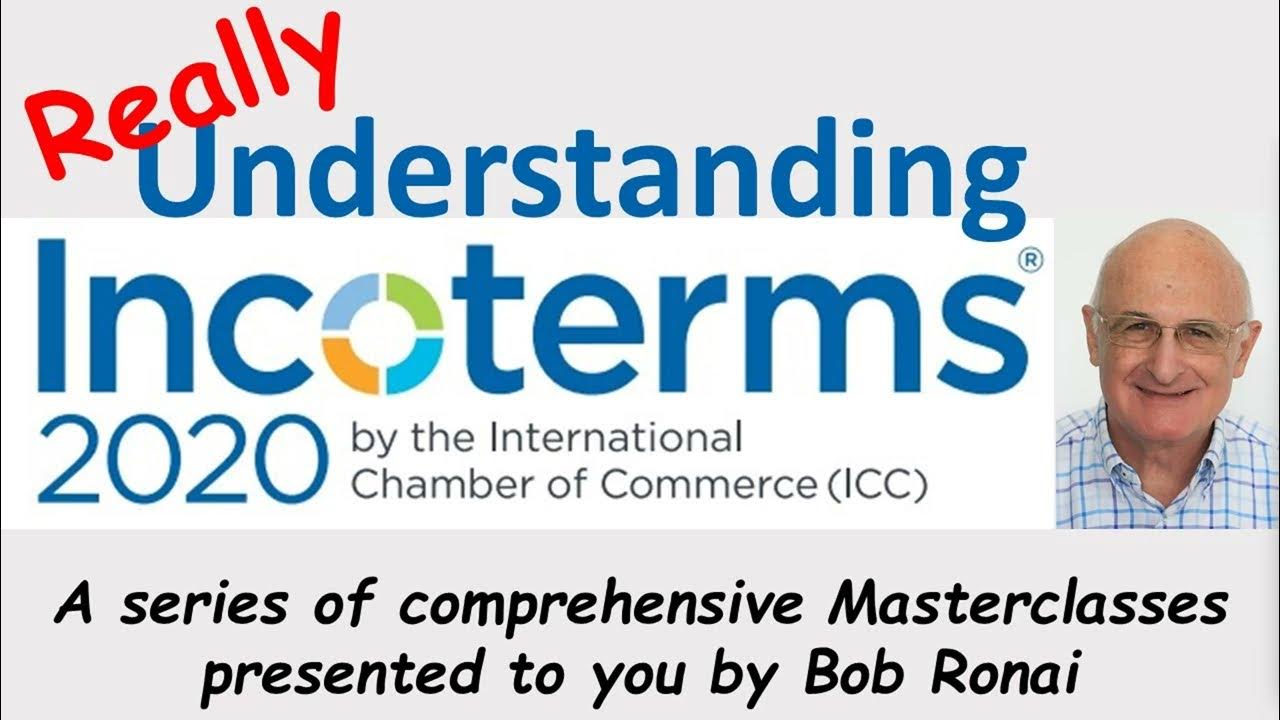Lesson 12 DPU part2
Summary
TLDRIn this comprehensive master class on Incoterms 2020, Bob Ronai explains key concepts related to DPU (Delivered at Place Unloaded), focusing on various transport modes, including air, rail, road, and break bulk. He provides in-depth insights into the seller's responsibilities, including delivery, unloading, and the potential challenges that may arise during the transportation process. Ronai also emphasizes the importance of clear contracts, managing logistics, and addressing issues like import formalities, carrier charges, and buyer obligations. The lesson concludes with a preview of upcoming topics, ensuring a complete understanding of Incoterms 2020 for better trade practices.
Takeaways
- 😀 The course is focused on Incoterms 2020, particularly the DPU (Delivered at Place Unloaded) rule and its variations in transport modes.
- 😀 The speaker, Bob Ronai, emphasizes his extensive experience in international trade, and clarifies that the content provided is not legal advice.
- 😀 The DPU rule requires the seller to unload the goods at the destination, either at a terminal or the buyer's premises, depending on the agreement.
- 😀 The seller is responsible for all terminal handling and storage charges until the goods are unloaded, with the buyer assuming responsibility thereafter.
- 😀 For air freight under DPU, the buyer is responsible for import formalities, while the seller covers the cost of delivery from the airport terminal to the buyer's premises.
- 😀 The seller must also ensure that their carrier unloads the goods, with potential complications like delays and storage charges arising from the buyer's failure to accept delivery.
- 😀 In cases of default by the buyer, the seller may face additional costs, including storage fees and difficulties in returning goods due to export regulations in the buyer's country.
- 😀 DPU for rail transport follows similar rules as air freight, with the buyer taking responsibility for import formalities, and the seller ensuring delivery to the buyer's premises.
- 😀 The seller must also manage the logistics coordination for rail shipments, which involves multiple parties including forwarders, customs brokers, and local agents.
- 😀 DPU can also apply to bulk or break bulk shipments, but it requires the seller to include unloading arrangements in the contract, usually at the port or terminal using the vessel's own equipment.
- 😀 The next lesson will focus on other aspects of DPU delivery, including cost allocation and transport documents.
Q & A
What is the main focus of the video script?
-The video focuses on explaining the Incoterms 2020, specifically the DPU (Delivered at Place Unloaded) term and its implications for different modes of transportation such as air, rail, road, and bulk shipments.
What is the responsibility of the seller in DPU delivery terms?
-In DPU delivery, the seller is responsible for unloading the goods from the arriving means of transport and delivering them to the agreed point at the buyer's disposal. The seller also covers all costs up to the delivery point.
What are the buyer’s responsibilities under DPU delivery for air freight?
-The buyer must arrange for import formalities, pay for terminal handling charges beyond free time, and cover storage costs at the air terminal. The buyer is also responsible for contracting the transport to take the goods from the terminal to their premises.
What potential issues can the seller face when delivering goods under DPU terms?
-The seller may face issues such as delays in unloading, storage charges if the buyer doesn't accept the delivery on time, and complications with customs or export rules in the buyer’s country. The seller must also coordinate with the buyer’s agents for unloading and transportation.
How does DPU delivery for rail transportation differ from air freight?
-In rail transportation under DPU terms, the seller is responsible for unloading the goods at the rail terminal. The buyer, like in air freight, is responsible for import formalities and handling terminal charges beyond the free time, but the delivery process involves the rail terminal and potentially a rail siding if available.
What is the seller’s responsibility when delivering via road under DPU terms?
-The seller is responsible for delivering the goods from the seller's premises to the buyer’s premises. The seller also must provide the necessary unloading equipment and labor, as well as ensure that the delivery is completed on time. Any truck delay charges beyond the agreed unloading time are the seller’s responsibility.
What are the possible complications in DPU delivery when using bulk or break bulk shipping?
-In bulk or break bulk shipping, the seller needs to include unloading from the vessel in the contract of carriage. This can involve additional logistics complexities such as using the vessel’s equipment or port infrastructure to unload the goods.
Why is clarity in the sales contract essential for DPU deliveries?
-Clarity is essential in the sales contract to ensure that both the buyer and seller understand their obligations regarding unloading, handling charges, import formalities, and any delays that might result in extra charges. This avoids disputes and ensures smooth delivery.
What should a seller consider if the buyer defaults in taking delivery of the goods?
-If the buyer defaults on accepting delivery, the seller may incur additional storage costs charged by the carrier. In some cases, it may be difficult to return the goods or ship them to another country due to export rules in the buyer's country.
What issues may arise when the buyer requires the seller’s carrier to meet specific conditions, such as insurance or work permits?
-The buyer may require the seller’s carrier to meet strict conditions, such as providing evidence of insurance, work permits, visas, or even completing site inductions. This can add additional administrative burden for the seller to comply with these requirements before completing the delivery.
Outlines

This section is available to paid users only. Please upgrade to access this part.
Upgrade NowMindmap

This section is available to paid users only. Please upgrade to access this part.
Upgrade NowKeywords

This section is available to paid users only. Please upgrade to access this part.
Upgrade NowHighlights

This section is available to paid users only. Please upgrade to access this part.
Upgrade NowTranscripts

This section is available to paid users only. Please upgrade to access this part.
Upgrade Now5.0 / 5 (0 votes)





